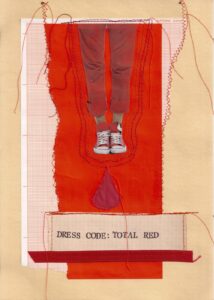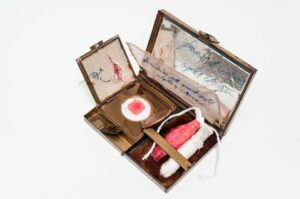At a time when feminicides are constantly on the increase, despite the fact that our mature democratic society should be psychologically tempered to accept that women are emancipated and independent, their condition is still disadvantaged and complex, especially in our country. The attentive gaze of the artists who animate the exhibition entitled ‘Femminile Plurale’ on show at the Dr. Fake Cabinet Gallery in Turin until 13 February 2023 is precisely directed at issues that are closely related to the world of women. The skill of the curator, Margaret Sgarra, has been to narrate a path that not only touches on the different points of view of female life, but also to gather artists of different ages, capable of interpreting it with their own experiences and sensitivity.

Alice Biondin, serie Bleeding Days, mixed media collage, 32,5 x 41 cm, courtesy Dr. Fake Cabinet
The bright red of the works in Alice Biondin‘s “Bleeding days” series is aimed at analysing the role of women’s menstruation, a physical condition that is still so socially difficult to accept, so much so that we are unable to attribute to it the naturalness that belongs to it. After all, if we consider that the ‘Stop tampon tax’ battle on the taxation of tampons, addressing the fiscal aspect of a discourse that was strongly interconnected with the human aspect, led to a decrease in the rate of taxation of these goods only in 2021 in Italy, we can realize how much marginality has been attributed to this issue, so fundamental for women, but not so much for society as a whole. With sensitivity and irony, Alice highlights how complex the role of women is in its most intimate sense, playing with catchy phrases and images that belong to the female world like the mythical Wonder Woman, also afflicted by her menstrual cycle!

Rosita D’Agrosa, Feminist est quod est propter uterum, mixed media, courtesy Dr. Fake Cabinet
In Rosita D’Agrosa‘s works, the concept of the changing body also returns, so that in the ‘Mutatis Mutanda’ series, taking her cue from a garment such as women’s pants, the artist produces, with the help of unusual materials, artworks that emphasize the different moments of the female cycle. With the work “Feminist est quod est propter uterum”, Rosita uses an iconographic medium of the patriarchal role of women, such as embroidery, in a disruptive manner, to construct a casket depicting intimate elements of femininity, to be kept inside a miniature Wunderkammer.

Silvia Levenson, Finché morte non ci separi, molten glass in mould, courtesy Dr. Fake Cabinet
Silvia Levenson‘s installations instead contrast love and violence in relationships. In the installation ‘Till Death Do Us Part’, a transparent glass wedding cake, silk-screen printed as if to reproduce the characteristic friezes, is embellished at the apex with a pink hand grenade to signify how an idyllic relationship can become fragile and turn into a prison where violence can predominate.

Paola Agosti, La donna e la macchina, Vallemosso (Biella) Lanificio Giuseppe Botto, 1983, modern print, courtesy Dr. Fake Cabinet
Paola Agosti‘s photographs from the ‘Woman and Machine” series refer to the role of women in the North Italy factories from the 1980s. The black and white images underline how women were included in the most varied production roles, which had always been the prerogative of men, thus acquiring a role of primary importance in the assembly line that was not and still is not followed by an equally important role in society as a whole.
Info:
A.A. V.V. Femminile plurale
19/01/2023 – 13/02/2023
Via San Francesco da Paola 12/d Torino
Dr. Fake Cabinet
Cover image: Rosita D’Agrosa, Mutatis Mutanda, 46 x 41 cm , nails (180 g), mixed technique, courtesy Dr. Fake Cabinet

Globetrotter, passionate about literature, lover of art and photography. I never leave for a trip without taking with me a book by an author of the place where I will go. I have dreamed of moving to Paris for years and sooner or later I will!






NO COMMENT